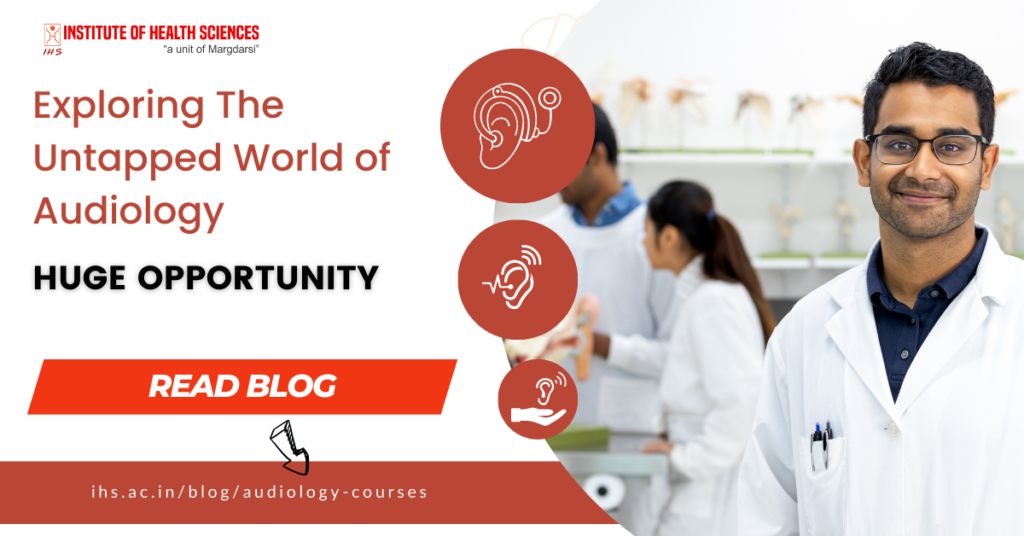Do you want to peruse Audiology Courses?
Then this article will provide an complete overview of the world of audiology, exploring its importance, scope, and the wide range of career opportunities it offers.
What is Audiology?
Definition of audiology and its role in healthcare.
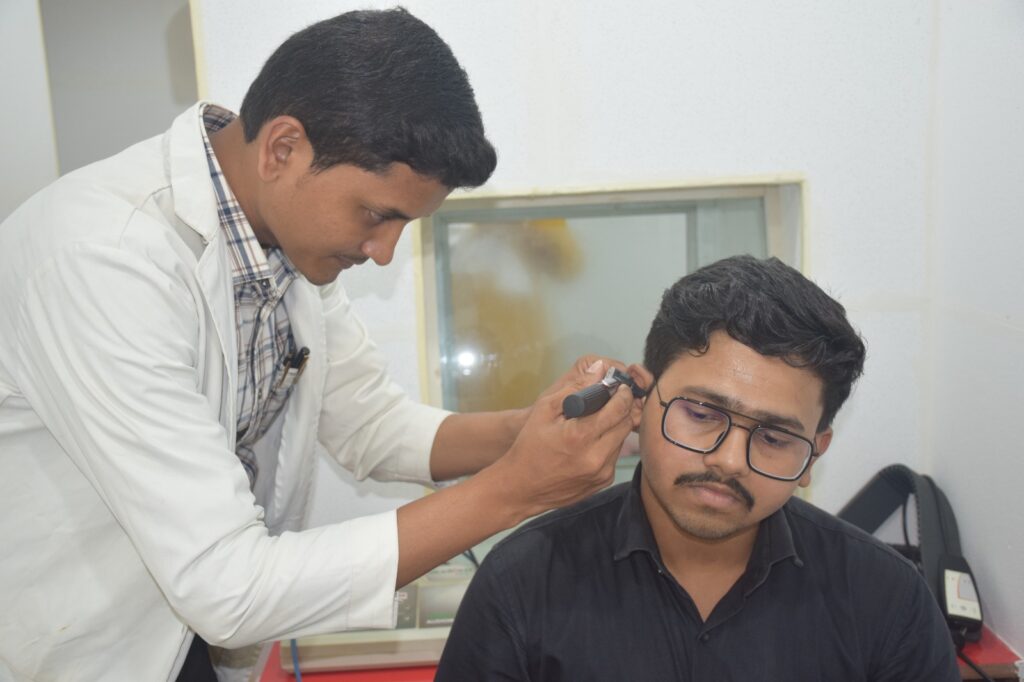
Audiology is a specialized field within healthcare that focuses on the diagnosis and treatment of hearing and balance disorders.
It is a vital profession that plays a crucial role in improving individuals’ communication abilities, quality of life, and overall well-being.
Audiologists are trained professionals who assess, manage, and rehabilitate individuals with auditory and vestibular system disorders.
In audiology, professionals work with individuals of all ages, from infants to the elderly, addressing various conditions related to hearing and balance.
They employ a range of assessment techniques, advanced technologies, and intervention strategies to evaluate and treat these disorders.
Explanation of the scope of practice for audiologists
The scope of practice for audiologists is broad and encompasses multiple areas.
They perform comprehensive hearing evaluations, conduct specialized tests to assess different aspects of auditory function, and interpret the results to provide accurate diagnoses.
Audiologists also provide counseling and guidance to individuals and their families, helping them understand their condition and explore appropriate treatment options.
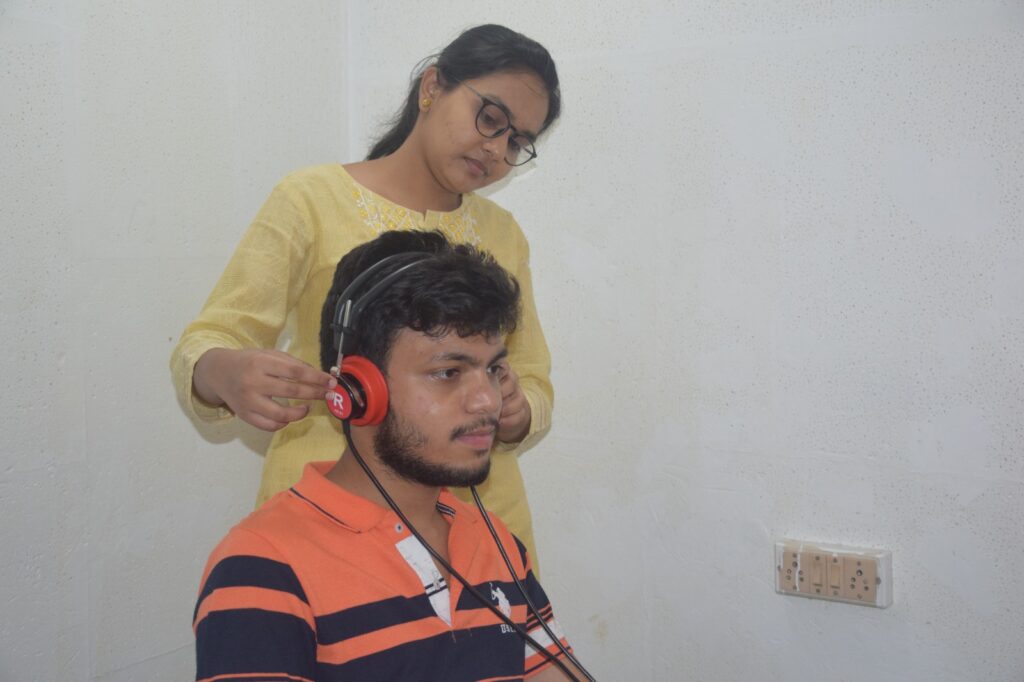
In addition to hearing disorders, audiology also focuses on balance and vestibular disorders.
Audiologists assess and manage conditions such as dizziness, vertigo, and imbalance, collaborating with other healthcare professionals to provide comprehensive care.
Audiology is a dynamic field that continually incorporates technological advancements.
Audiologists work with sophisticated equipment such as audiometers, otoacoustic emission analyzers, and computerized balance assessment systems to conduct assessments and interventions.
They also stay updated with the latest research and advancements in hearing aids, cochlear implants, assistive listening devices, and other hearing technologies.
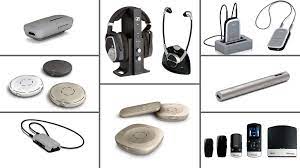
By pursuing an audiology courses, individuals gain a strong foundation in the anatomical, physiological, and psychological aspects of hearing and balance.
They learn about various hearing disorders, assessment techniques, and intervention strategies. Additionally, audiology courses provide practical training, including clinical practicum and internships, where students gain hands-on experience in working with patients under the supervision of experienced audiologists.
Overview of the diverse areas audiology covers, including hearing assessment, auditory rehabilitation, and balance disorders
Choosing audiology courses opens up diverse career opportunities, including working in hospitals, clinics, educational institutions, research centers, or private practice.
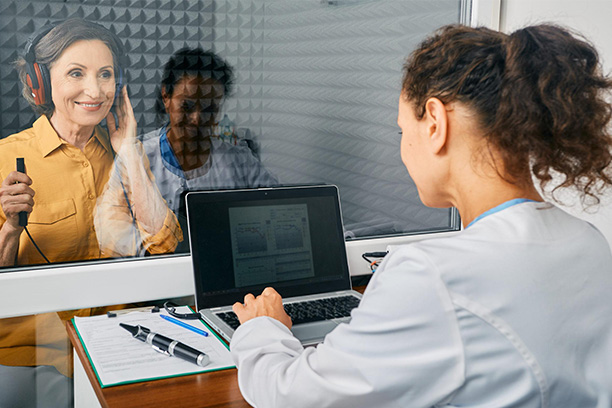
Audiologists can specialize in areas such as pediatric audiology, geriatric audiology, balance disorders, or cochlear implants, tailoring their expertise to meet the unique needs of specific patient populations.
Overall, audiology is a fascinating and essential field that combines science, technology, and compassion to address hearing and balance disorders.
Pursuing a BASLP Course provides individuals with the knowledge and skills needed to embark on a rewarding career dedicated to improving the lives of others through better hearing and balance health.
Importance of Audiology in Society:
Audiology plays a crucial role in society by addressing the prevalence and impact of hearing and balance disorders. Any one is interested to become Audiologist, can peruse BASLP.
The importance of audiology services extends beyond the individual level, impacting communication, cognition, and overall well-being in various aspects of life.
Here are some key points highlighting the significance of audiology in society
- Addressing the Prevalence of Hearing Loss:
- Hearing loss affects millions of people worldwide, cutting across age groups and demographics.
- Audiology professionals are at the forefront of diagnosing and managing hearing loss, helping individuals regain their auditory abilities and connect with the world around them.
- By addressing the prevalence of hearing loss, audiology contributes to creating a society where communication barriers are minimized.
- Improving Communication and Quality of Life:
- Effective communication is essential for social interactions, education, employment, and overall well-being.
- Audiology services enable individuals with hearing loss to access appropriate interventions, including hearing aids, cochlear implants, and assistive listening devices.
- By improving communication abilities, audiology professionals enhance individuals’ quality of life, enabling them to actively participate in conversations, engage in educational and work settings, and maintain social connections.
- Enhancing Cognitive Function:
- Research suggests a strong link between untreated hearing loss and cognitive decline, including an increased risk of dementia.
- Audiological interventions, such as hearing aids and auditory rehabilitation, can help minimize cognitive decline by improving auditory input and reducing cognitive load.
- By addressing hearing loss and promoting optimal auditory function, audiology contributes to maintaining cognitive health and preserving cognitive abilities.
- Supporting Academic Success:
- Children with hearing loss face unique challenges in educational settings.
- Audiologists work closely with schools and educational institutions to provide appropriate interventions, accommodations, and support services to students with hearing loss.
- By ensuring access to auditory information and facilitating effective communication, audiology professionals contribute to the academic success and overall development of students with hearing loss.
- Promoting Workplace Inclusion:
- Individuals with hearing loss often face barriers in the workplace due to communication difficulties.
- Audiologists play a vital role in providing workplace accommodations and strategies to ensure equal opportunities for individuals with hearing loss.
- By promoting workplace inclusion, audiology helps create diverse and inclusive work environments where individuals with hearing loss can thrive professionally.
Audiology Courses Overview:
The audiology course provides students with a comprehensive understanding of the field, equipping them with the knowledge and skills necessary to become competent audiologists.
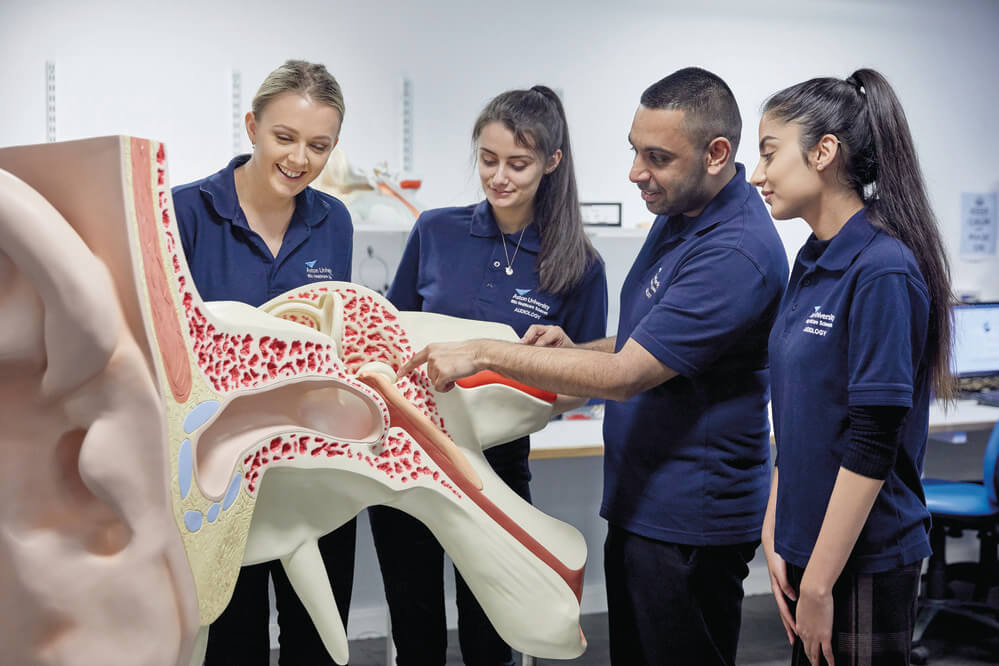
The course curriculum encompasses various subjects, both theoretical and practical, that lay the foundation for a successful career in audiology. Check BASLP course details.
Here are key aspects of the audiology course:
- Bachelor’s/Master’s/Doctoral Level Programs:
- Audiology courses are offered at different academic levels, including Bachelor’s, Master’s, and Doctoral degrees.
- Bachelor’s programs provide a solid introduction to audiology, while Master’s and Doctoral programs offer more advanced and specialized coursework and clinical training.
- Curriculum and Coursework:
- The audiology curriculum covers a wide range of topics, ensuring a comprehensive understanding of the field.
- Core coursework typically includes subjects such as anatomy and physiology of the auditory system, hearing science, auditory disorders, assessment techniques, and rehabilitation strategies.
- Students also study topics like speech and language development, psychoacoustics, research methods, and professional ethics.
- Foundation in Basic Sciences:
- Audiology courses emphasize foundational sciences related to hearing and balance.
- Students gain knowledge in areas such as anatomy, physiology, neuroanatomy, acoustics, and psychology, which form the basis for understanding the auditory system and its disorders.
- Clinical Skills Development:
- Practical training is a crucial component of audiology courses.
- Students learn to perform various diagnostic assessments, including pure-tone audiometry, speech audiometry, immittance testing, otoacoustic emissions, and auditory brainstem response.
- They develop skills in interpreting test results, diagnosing hearing disorders, and formulating appropriate treatment plans.
- Hands-on Training and Clinical Practicum:
- Audiology courses include clinical practicum experiences that provide students with hands-on training under the supervision of experienced audiologists.
- During these clinical placements, students work with actual patients, conduct assessments, fit hearing aids, provide counseling, and participate in multidisciplinary teams.
- Clinical practicum allows students to apply their knowledge, develop practical skills, and gain real-world experience in diverse audiology settings.
- Interdisciplinary Collaboration:
- Audiology courses often emphasize the importance of interdisciplinary collaboration.
- Students learn to work collaboratively with professionals from related fields, such as speech-language pathology, otolaryngology, psychology, and education, to provide comprehensive care to individuals with hearing and balance disorders.
- Research and Evidence-Based Practice:
- Many audiology courses incorporate research components, fostering an understanding of research methodology and promoting evidence-based practice.
- Students learn to critically evaluate scientific literature, engage in research projects, and contribute to the advancement of audiology knowledge.
Core Topics in Audiology Courses: Audiology Course Syllabus
Audiology courses cover a wide range of core topics that provide students with a comprehensive understanding of the field.
These topics delve into the various aspects of hearing and balance disorders, assessment techniques, and intervention strategies. You can also explore complete BASLP Syllabus.
Here are key core topics covered in audiology courses:
- Anatomy and Physiology of the Auditory System:
- Students learn about the structure and function of the auditory system, including the outer, middle, and inner ear, as well as the auditory pathways to the brain.
- They study the anatomy and physiology of key components, such as the cochlea, auditory nerve, and central auditory processing centers.
- Assessment Techniques for Hearing Disorders:
- Students learn a variety of assessment techniques to evaluate hearing disorders.
- These techniques include pure-tone audiometry, speech audiometry, immittance testing (tympanometry and acoustic reflex testing), otoacoustic emissions, and auditory brainstem response (ABR) testing.
- Students gain proficiency in conducting these tests, interpreting the results, and using them to diagnose different types and degrees of hearing loss.
- Rehabilitation and Intervention Strategies:
- This topic focuses on the various interventions and strategies used to manage hearing disorders and promote auditory rehabilitation.
- Students learn about the fitting and selection of hearing aids, including different types, technology features, and programming techniques.
- They also explore assistive listening devices, such as FM systems and captioning devices, which enhance communication abilities for individuals with hearing loss.
- Additionally, students may study auditory training, speechreading (lip-reading) techniques, and communication strategies for individuals with hearing loss.
- Pediatric Audiology:
- This topic concentrates on the assessment and management of hearing disorders in children.
- Students learn about the unique considerations in working with infants and young children, including specialized testing procedures, behavioral observation audiometry, and visual reinforcement audiometry.
- They also explore early intervention strategies, counseling for families, and the fitting and management of hearing aids and cochlear implants in pediatric populations.
- Cochlear Implants and Assistive Hearing Technologies:
- Students gain knowledge about cochlear implants, including their design, function, candidacy criteria, surgical procedure, and programming.
- They learn about the benefits and limitations of cochlear implants and how to support individuals who use them.
- Additionally, students may study other assistive hearing technologies, such as bone-anchored hearing aids (BAHAs), middle ear implants, and auditory brainstem implants.
- Auditory Disorders and Pathologies:
- This topic focuses on the various auditory disorders and pathologies that can impact hearing and balance.
- Students learn about conditions such as sensorineural hearing loss, conductive hearing loss, central auditory processing disorders, tinnitus, and vestibular disorders.
- They gain an understanding of the etiology, symptoms, diagnostic criteria, and treatment options for these disorders.
- Professional Ethics and Communication:
- Audiology courses emphasize the importance of professional ethics and effective communication skills.
- Students learn about ethical considerations in providing audiological services, maintaining patient confidentiality, and adhering to professional codes of conduct.
- They also develop effective communication strategies for working with individuals with hearing loss and their families, fostering rapport, and delivering information in a clear and empathetic manner.
Clinical Practicum and Internship Experiences in Audiology Courses:
Clinical practicum and internship experiences are essential components of audiology courses, providing students with hands-on training and real-world exposure to the field.
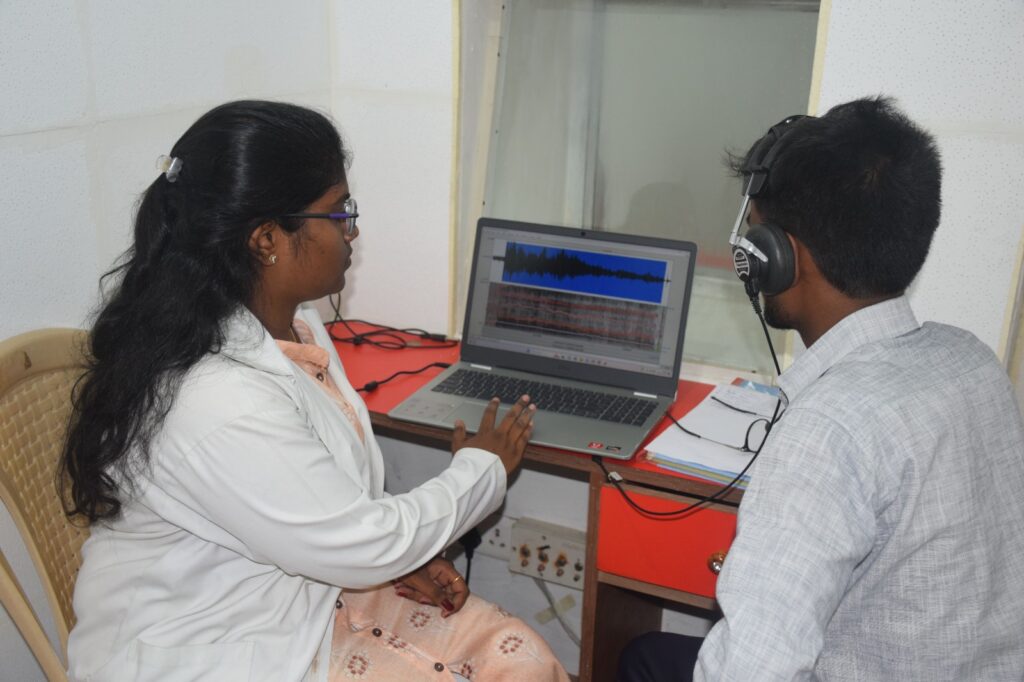
These practical experiences complement the theoretical knowledge gained in the classroom and allow students to apply their skills in a clinical setting.
Here are key aspects of clinical practicum and internship experiences in audiology courses:
- Clinical Placement Settings:
- Students are placed in various clinical settings, such as hospitals, audiology clinics, educational institutions, research centers, or private practices.
- These diverse settings expose students to different patient populations and clinical scenarios, broadening their understanding of audiology practice.
- Supervised Clinical Training:
- Clinical practicum and internship experiences are conducted under the supervision of experienced audiologists.
- Supervisors guide and mentor students, providing feedback and support as they develop their clinical skills.
- Students have the opportunity to observe and learn from audiologists’ expertise, gaining insights into best practices and professional conduct.
- Patient Interaction and Assessment:
- During clinical placements, students interact with patients of all ages with varying degrees and types of hearing and balance disorders.
- They conduct comprehensive patient interviews, gathering relevant medical history and assessing the impact of hearing loss on individuals’ daily lives.
- Students also perform a range of diagnostic assessments, including audiometric testing, immittance testing, and electrophysiological measures, to evaluate patients’ auditory function.
- Treatment Planning and Intervention:
- Based on assessment results, students participate in treatment planning and intervention strategies.
- They may assist in the selection and fitting of hearing aids, programming cochlear implants, or recommending assistive listening devices to improve communication abilities.
- Students gain exposure to counseling techniques, helping individuals and their families understand their hearing loss, manage expectations, and address psychosocial aspects of hearing impairment.
- Multidisciplinary Collaboration:
- Clinical practicum and internships provide opportunities for students to collaborate with professionals from other disciplines.
- Students may work alongside speech-language pathologists, otolaryngologists, psychologists, educators, and other healthcare providers to deliver comprehensive care to patients.
- This interdisciplinary collaboration fosters a holistic approach to patient management and enhances students’ understanding of the broader healthcare context.
- Professional Development:
- Clinical practicum and internships also focus on developing students’ professional skills and attributes.
- Students learn about professional ethics, patient confidentiality, documentation practices, and maintaining professionalism in clinical settings.
- They develop effective communication skills, including rapport-building, active listening, and clear explanation of test results and treatment options.
- Gradual Progression of Responsibility:
- Clinical experiences are structured to allow students to gradually assume more responsibility as they gain competence and confidence.
- Initially, students observe and assist their supervisors in various clinical procedures.
- As their skills progress, they take on more independent responsibilities, conducting assessments and providing interventions under supervision.
Audiology Research and Advancements:
Research plays a crucial role in advancing the field of audiology, leading to new discoveries, improved assessment techniques, and innovative interventions for individuals with hearing and balance disorders.
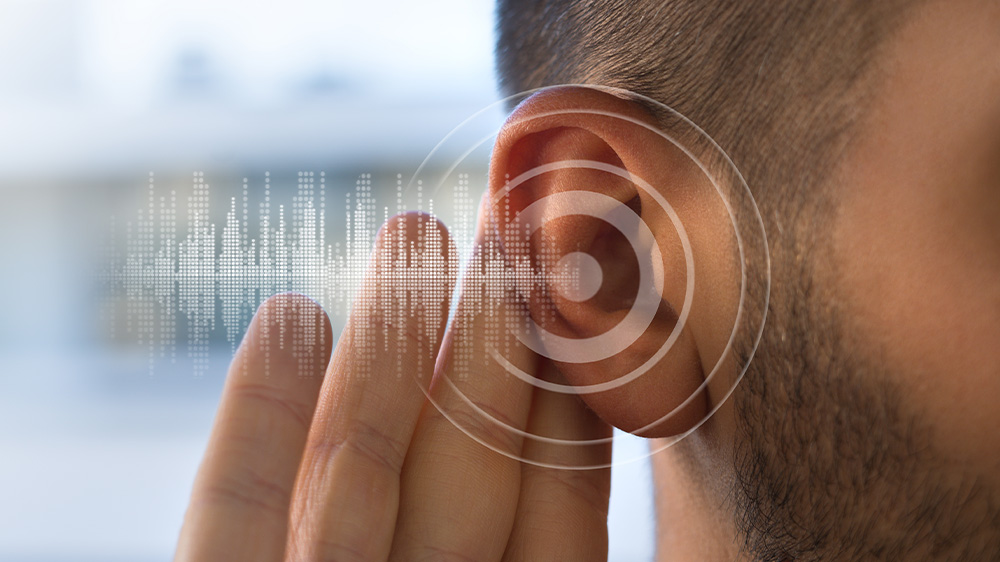
Audiologists, scientists, and researchers continuously strive to expand knowledge, refine diagnostic methods, and develop effective treatments.
Here are key aspects of audiology research and advancements:
Hearing and Balance Research:
- Audiology research focuses on understanding the mechanisms, functions, and disorders of hearing and balance.
- Scientists and audiologists investigate the anatomy and physiology of the auditory and vestibular systems, seeking to unravel the complex processes involved in hearing and balance perception.
- Research in hearing and balance disorders aims to identify the underlying causes, risk factors, and potential interventions for conditions such as sensorineural hearing loss, tinnitus, vestibular disorders, and auditory processing disorders.
Diagnostic Advancements:
- Research drives advancements in diagnostic techniques, enabling more accurate and efficient assessment of hearing and balance disorders.
- Researchers explore new technologies and methodologies to improve the precision and reliability of diagnostic tests, such as pure-tone audiometry, otoacoustic emissions, auditory brainstem response (ABR), and balance assessments.
- These advancements contribute to earlier and more accurate diagnoses, allowing for timely intervention and improved outcomes for individuals with hearing and balance disorders.
Intervention and Treatment Innovations:
- Research plays a vital role in developing innovative interventions and treatment options for individuals with hearing and balance disorders.
- Scientists and audiologists explore new technologies, such as advanced hearing aids, cochlear implants, bone-anchored hearing aids (BAHAs), and vestibular rehabilitation techniques, to improve hearing and balance outcomes.
- Clinical trials and studies evaluate the effectiveness of these interventions, leading to evidence-based practices and guidelines for their implementation.
Genetics and Molecular Research:
- Genetic and molecular research in audiology focuses on identifying the genetic factors underlying various hearing and balance disorders.
- Researchers investigate the genes associated with hereditary hearing loss, syndromic hearing loss, and disorders affecting the auditory and vestibular systems.
- Understanding the genetic basis of these conditions helps in early identification, genetic counseling, and potential gene-based therapies in the future.
Brain Plasticity and Auditory Training:
- Research in brain plasticity and auditory training explores the brain’s ability to adapt and reorganize in response to sensory input and training.
- Scientists investigate techniques such as auditory training programs, cognitive training, and neurofeedback to enhance auditory processing, speech perception, and overall communication abilities.
- This research contributes to the development of targeted interventions that promote neuroplasticity and improve outcomes for individuals with hearing and auditory processing difficulties.
Teleaudiology and Remote Care:
- Research in teleaudiology aims to leverage technology to provide audiological services remotely, expanding access to care for individuals in remote or underserved areas.
- Researchers explore teleaudiology platforms, remote hearing assessments, and tele-rehabilitation programs, assessing their feasibility, effectiveness, and patient satisfaction.
- Teleaudiology research also investigates the integration of artificial intelligence (AI) and machine learning algorithms in remote hearing assessments and personalized hearing healthcare.
Collaborative Research Efforts:
- Collaborative research efforts among audiologists, scientists, engineers, and other healthcare professionals contribute to multidisciplinary advancements in audiology.
- These collaborations foster innovative approaches, such as the integration of audiology with neuroscience, psychology, engineering, and data science, leading to new insights and breakthroughs in the field.
Audiology research and advancements are instrumental in improving the lives of individuals with hearing and balance disorders.
By pushing the boundaries of knowledge and embracing innovation, researchers and audiologists contribute to the development of evidence-based practices
Career Opportunities in Audiology Courses:

Audiology offers a wide range of rewarding career opportunities for individuals passionate about helping people with hearing and balance disorders.
Graduates of audiology courses can pursue diverse career paths in various settings, working with individuals of all ages and backgrounds. Here are some of the career opportunities available in audiology:
Clinical Audiologist:
- Clinical audiologists work in healthcare settings, such as hospitals, audiology clinics, and rehabilitation centers.
- They assess and diagnose hearing and balance disorders, provide intervention and treatment options, and offer counseling and support to patients and their families.
- Clinical audiologists may also specialize in specific areas, such as pediatric audiology, cochlear implants, or vestibular disorders.
Educational Audiologist:
- Educational audiologists work in school settings, collaborating with teachers, speech-language pathologists, and other professionals to support students with hearing loss.
- They assess and monitor students’ hearing abilities, provide recommendations for assistive listening devices, and ensure accessibility in educational environments.
- Educational audiologists may also develop individualized education plans (IEPs) and provide training to school staff on hearing-related accommodations.
Research Audiologist:
- Research audiologists contribute to the advancement of audiology knowledge and practice through research and academia.
- They conduct studies, investigate new assessment techniques and intervention strategies, and publish their findings in scientific journals.
- Research audiologists may work in academic institutions, research centers, or industry, collaborating with multidisciplinary teams to push the boundaries of audiological research.
Industrial Audiologist:
- Industrial audiologists focus on occupational audiology, working in industries to prevent, assess, and manage hearing loss and noise-induced disorders among workers.
- They conduct hearing screenings, implement hearing conservation programs, provide training on hearing protection, and recommend appropriate interventions to protect workers’ hearing health.
Government and Public Health Audiologist:
- Government and public health audiologists work in governmental organizations, public health departments, or non-profit agencies.
- They contribute to public health initiatives related to hearing and balance disorders, including conducting community outreach, raising awareness, and advocating for accessible services and policies.
Military Audiologist:
- Military audiologists provide audiological services to military personnel, veterans, and their families.
- They conduct hearing screenings, assess noise-induced hearing loss, fit and maintain hearing protection devices, and offer rehabilitative services to support individuals in military environments.
Teleaudiologist:
- Teleaudiology is an emerging field that utilizes technology to provide audiological services remotely.
- Teleaudiologists offer online assessments, consultations, and remote hearing aid adjustments, expanding access to audiological care in rural or underserved areas.
These are just a few examples of the diverse career opportunities available in audiology.
Regardless of the specific career path chosen, professionals in audiology have the opportunity to make a significant impact on individuals’ lives, helping them overcome communication barriers, improve their quality of life, and participate fully in society.
With the increasing prevalence of hearing and balance disorders, the demand for audiologists is expected to grow, providing excellent prospects for those entering the field.
Professional Associations and Continuing Education:
Professional associations play a crucial role in the field of audiology, providing a platform for audiologists and related professionals to network, collaborate, and stay updated with the latest advancements in the field.
These associations offer numerous benefits, including opportunities for continuing education, professional development, advocacy, and access to resources.
Here are key aspects of professional associations and continuing education in audiology:
Professional Associations:
- Professional associations, such as the American Academy of Audiology (AAA), British Academy of Audiology (BAA), and Australian Association of Audiologists (AAA), bring together audiologists and related professionals.
- These associations provide a community for members to connect, share knowledge, and collaborate on research, clinical practices, and policy development.
- Membership in professional associations offers various benefits, including access to conferences, journals, publications, and online forums where members can stay updated on industry trends and best practices.
Continuing Education:
- Continuing education is an integral part of the audiology profession, ensuring that professionals stay current with evolving research, technology, and clinical practices.
- Professional associations often organize conferences, workshops, and webinars where audiologists can engage in continuing education opportunities.
- These events feature renowned speakers, researchers, and practitioners who present the latest findings, advancements, and techniques in audiology.
- Continuing education allows audiologists to expand their knowledge, enhance their clinical skills, and stay informed about emerging trends and evidence-based practices.
Continuing Education Units (CEUs):
- Many professional associations and licensing boards require audiologists to earn a certain number of Continuing Education Units (CEUs) to maintain their licensure or certification.
- CEUs are awarded for participation in approved continuing education activities, such as attending conferences, completing online courses, or engaging in research or clinical training.
- These CEU requirements encourage audiologists to engage in lifelong learning and professional development, ensuring they provide the highest quality of care to their patients.
Specialty Certification:
- Professional associations may offer specialty certification programs that recognize audiologists’ expertise in specific areas of practice.
- These certifications demonstrate advanced knowledge and skills in specialized fields such as pediatric audiology, cochlear implants, tinnitus management, or vestibular assessment and rehabilitation.
- Specialty certification provides professional recognition, enhances career opportunities, and instills confidence in patients and colleagues regarding an audiologist’s specialized expertise.
Research Grants and Scholarships:
- Professional associations often offer research grants and scholarships to support audiologists in conducting research, advancing knowledge, and promoting evidence-based practice.
- These funding opportunities enable audiologists to pursue research projects, present findings at conferences, and contribute to the scientific community’s understanding of audiology.
Advocacy and Policy Development:
- Professional associations advocate for the interests of the audiology profession and work towards policy changes that benefit audiologists and the individuals they serve.
- They collaborate with regulatory bodies, government agencies, and other stakeholders to shape policies related to audiology practice, reimbursement, licensure, and accessibility of audiological services.
- Professional associations also raise awareness about the importance of hearing health, promote hearing conservation, and advocate for equitable access to hearing healthcare.
Professional associations and continuing education opportunities are invaluable resources for audiologists.
By actively participating in professional associations and engaging in continuing education, audiologists can stay up to date with advancements in the field, enhance their clinical skills, expand their professional network, and contribute to the growth and development of audiology as a profession.
Audiology Course Eligibility
For admission to BASLP course under IHS, the applicant must be:
Age limit- No Age Limit
- Qualification – Minimum +2 Science (12th standard or Higher Secondary School Certificate from any recognized board or university) with physics, chemistry & Mathematics/Biology.
- The applicant should have 50% marks in their qualifying examination.
- Those, whose results of qualifying exam are awaited, can also apply.
- The applicant shall face an Aptitude Test and shall be admitted on the basis of the test/interview.
Audiology Course In India
Audiology courses in India provide comprehensive training in the diagnosis, assessment, and treatment of hearing and balance disorders.
Institute of Health Sciences is one of the best BASLP Colleges in India. The institute has a 100% placement record.
IHS Bhubaneswar offers degree programs in the discipline of Physiotherapy, Audiology and Speech-Language Pathology.
For more than thirty years, this institution has influenced the paths of numerous Health Sciences students
BASLP degree will make a Clinician for dealing disorders of Head and neck region as an independent specialist. They deal with Hearing disorders, Balance Disorders, swallowing disorders, eating feeding disorders, speech defects, Language delay etc.
Audiologists deal with Intra operative monitoring, neural response telemetry in the operation theatre.
AFFILIATION AND RECOGNITION:
✅ Permanent Affiliation UTKAL UNIVERSITY
✅ B++ NAAC Accreditation (Quality Education Assured)
✅ Approved by RCI (Rehabilitation Council of India, New Delhi), a statutory body by Govt. of India
✅ Recognized by Govt. Of Odisha as REFERRAL HOSPITAL
✅ It has been associated with OPEPA/OCEPA in their integrated education for the disabled (IED) program
✅ Government of Odisha for medical officers and Para medical personnel.
✅ Recognized State Nodal Center of National Trust named Margdarsi,
Super Successful Alumni of Institute of Health Sciences, Bhubaneswar:
Biswajeet Sarangi, Managing director of Manning Audiology company of Australia, having a chain of 20 Clinics spread over different parts of the country.
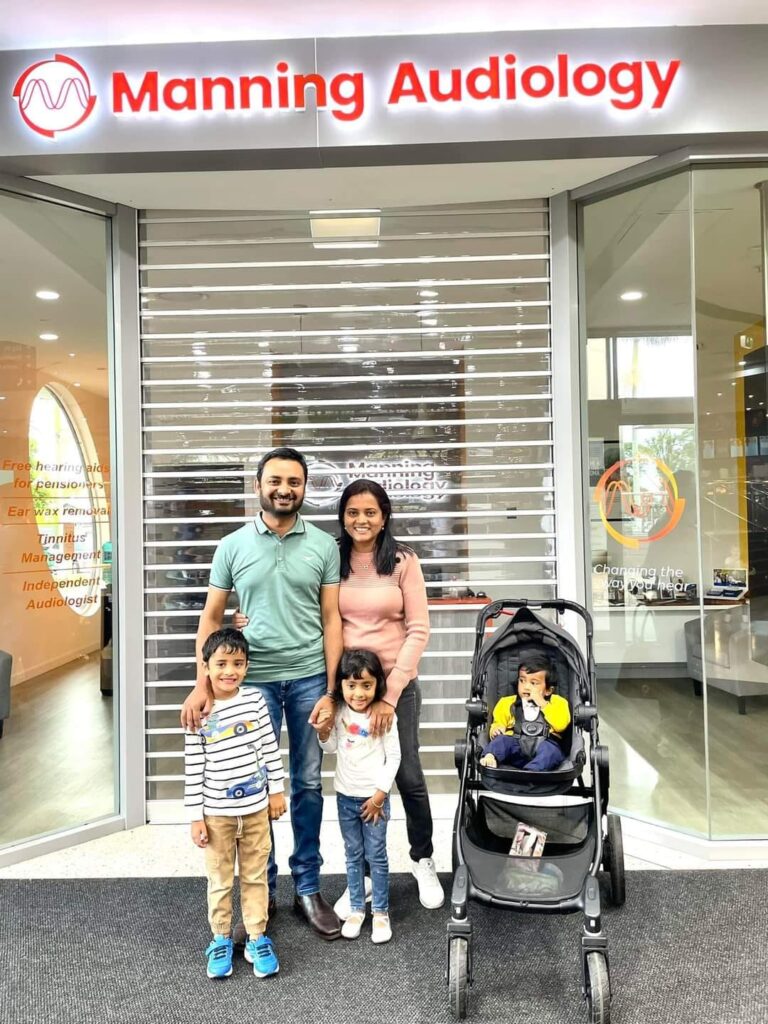
Audiology Course Fees
* 12 lakhs for 3 years including hostel and accommodation (1 year Internship)/
* 9.75 lakhs without hostel & accommodation
Different head of expenses covered for the academic program include following:
- Tuition Fee
- Practice fee
- Clinical fee
- Library fee
- Examination fee
- Development fee
- Hostel & accommodation charges
- Food (Breakfast, Lunch, Dinner)
- Internet Facility
Conclusion:
In conclusion, the field of audiology is a fascinating and rewarding profession that plays a crucial role in improving the lives of individuals with hearing and balance disorders.
This article has provided an overview of the world of audiology, exploring its importance, scope, and the wide range of career opportunities it offers.
Audiology courses serve as a gateway to entering this dynamic field, providing students with the knowledge, skills, and clinical experience necessary to become competent and compassionate audiologists.
The curriculum of audiology courses covers various essential topics, including anatomy and physiology of the auditory system, assessment techniques, intervention strategies, and professional ethics.
Through audiology courses, students gain a comprehensive understanding of hearing and balance disorders, develop proficiency in diagnostic procedures, and learn about the latest advancements in audiological research and technology.
These audiology courses also emphasize the importance of patient-centered care, effective communication, and interdisciplinary collaboration.
Contact BASLP Colleges in India for more information on admission process and how to get admission in BASLP.
[saswp_tiny_multiple_faq headline-0=”h4″ question-0=”is neet required for baslp” answer-0=”No, NEET (National Eligibility cum Entrance Test) is not required for admission to BASLP (Bachelor of Audiology and Speech-Language Pathology) courses. Admissions to BASLP programs are generally based on merit or entrance exams conducted by respective institutions.” image-0=”” headline-1=”h4″ question-1=”Is BASLP a good course?” answer-1=”Yes, BASLP is considered a good course for individuals interested in the field of audiology and speech-language pathology. It offers comprehensive knowledge and practical training in diagnosing and treating communication disorders, hearing impairments, and related conditions. BASLP graduates can pursue rewarding careers in hospitals, rehabilitation centers, schools, research institutions, and private practice.” image-1=”” headline-2=”h4″ question-2=”Is BASLP a good career option?” answer-2=”Yes, BASLP can be a rewarding career option for those passionate about helping individuals with communication disorders. The field of audiology and speech-language pathology offers diverse employment opportunities and a chance to make a positive impact on people’s lives. With increasing awareness and demand for communication healthcare services, a career in BASLP can be fulfilling and financially rewarding.” image-2=”” count=”3″ html=”true”]
